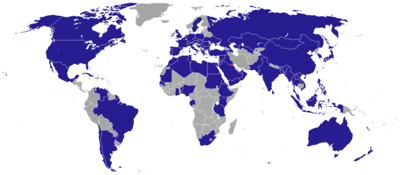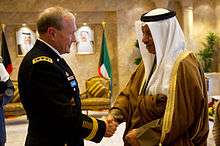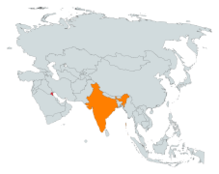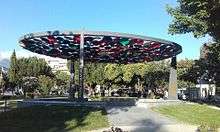Foreign relations of Kuwait
Since its independence in 1961, Kuwait maintained strong international relations with most countries, especially nations within the Arab world. Its vast oil reserves gives it a prominent voice in global economic forums and organizations like the OPEC. Kuwait is also a major ally of ASEAN, and a regional ally of China.
 |
|---|
| This article is part of a series on the politics and government of Kuwait |
|
|
|
Constitution |
|
|
Ruling family
|
|
|
|
Related topics
|
|
|
Overview

Regionally, Kuwait has a unique foreign policy that is characterized by neutrality. Kuwait's troubled relationship with neighboring Iraq formed the core of its foreign policy from late 1980s onwards. Its first major foreign policy problem arose when Iraq claimed Kuwaiti territory. Iraq threatened invasion, but was dissuaded by the United Kingdom's ready response to the Amir's request for assistance. Kuwait presented its case before the United Nations and successfully preserved its sovereignty. UK forces were later withdrawn and replaced by troops from Arab League nations, which were withdrawn in 1963 at Kuwait's request.
On 2 August 1990, Iraq invaded and occupied Kuwait. Largely through the efforts of King Fahd bin Abdulaziz of Saudi Arabia who was instrumental in obtaining the help of the U.S., a multinational coalition was assembled, and, under UN auspices, initiated military action against Iraq to liberate Kuwait. Arab states, especially the other five members of the Gulf Cooperation Council (Saudi Arabia, Bahrain, Qatar, Oman, and the United Arab Emirates), Egypt, and Syria, supported Kuwait by sending troops to fight with the coalition. Many European and East Asian states sent troops, equipment, and/or financial support.
After its liberation, Kuwait largely directed its diplomatic and cooperative efforts toward states that had participated in the multinational coalition. Notably, many of these states were given key roles in the reconstruction of Kuwait. Conversely, Kuwait's relations with nations that had supported Iraq, among them Jordan, Sudan, Yemen, and Cuba, have proved to be strained.
Since the conclusion of the Gulf War, Kuwait has made efforts to secure allies throughout the world, particularly United Nations Security Council members. In addition to the United States, defense arrangements have been concluded with Russia, the United Kingdom, and France. Close ties to other key Arab members of the Gulf War coalition — Egypt and Syria — also have been sustained.
Kuwait's foreign policy has been dominated for some time by its economic dependence on oil and natural gas. As a developing nation, its various economies are insufficient to independently support it. As a result, Kuwait has directed considerable attention toward oil or natural gas related issues. With the outbreak of the War on Iraq, Kuwait has taken a pro-U.S. stance, having been the nation from which the war was actually launched. It supported the Coalition Provisional Authority, with particular stress upon strict border controls and adequate U.S. troop presence. Kuwait also has good relations with Iran.
Kuwait is a member of the UN and some of its specialized and related agencies, including the World Bank (IBRD), International Monetary Fund (IMF), World Trade Organization (WTO), General Agreement on Tariffs and Trade (GATT); African Development Bank (AFDB), Arab Fund for Economic and Social Development (AFESD), Arab League, Arab Monetary Fund (AMF), Council of Arab Economic Unity (CAEU), Economic and Social Commission for Western Asia (ESCWA), Group of 77 (G-77), Gulf Cooperation Council (GCC), INMARSAT, International Development Association (IDA), International Finance Corporation, International Fund for Agricultural Development, International Labour Organization (ILO), International Marine Organization, Interpol, IOC, Islamic Development Bank (IDB), League of Red Cross and Red Crescent Societies (LORCS), Non-Aligned Movement, Organization of Arab Petroleum Exporting Countries (OAPEC), Organisation of Islamic Cooperation (OIC), Organization of Petroleum Exporting Countries (OPEC), and the International Atomic Energy Agency (IAEA).
International disputes
In November 1994, Iraq formally accepted the UN-demarcated border with Kuwait which had been spelled out in Security Council Resolutions 687 (1991), 773 (1992), and 883 (1993); this formally ends earlier claims to Kuwait and to Bubiyan and Warbah islands; ownership of Qaruh and Umm al Maradim islands disputed by Saudi Arabia. Kuwait and Saudi Arabia continue negotiating a joint maritime boundary with Iran; no maritime boundary exists with Iraq in the Persian Gulf.
Bilateral relations
Africa
| Country | Formal Relations Began | Notes |
|---|---|---|
| ||
| ||
| ||
See Kenya–Kuwait relations
| ||
| ||
| ||
| ||
|
Americas
| Country | Formal Relations sarted | Notes |
|---|---|---|
| ||
| 5 September 2006 |
Both countries established diplomatic relations on 5 September 2006.[4] | |
| ||
|
In 1965, official relations between Kuwait and Canada were launched when the US ambassador to Kuwait began to act as a non-resident ambassador to Canada.[5] In 1978, Canada opened its embassy in Kuwait City.[5] Kuwait opened its embassy in Ottawa in 1993.[5] | ||
| ||
| 23 July 1975 | See Kuwait–Mexico relations
| |
See Kuwait–United States relations
 United States Chairman of the Joint Chiefs of Staff, Martin Dempsey, with Kuwaiti Prime Minister Sheikh Jaber Mubarak Al-Sabah in 2011. The United States opened a consulate in Kuwait in October 1951, which was elevated to embassy status at the time of Kuwait's independence 10 years later. | ||
|
Asia
Kuwait, is a member of the Cooperation Council for the Arab States of the Gulf, which includes, Saudi Arabia, Bahrain, Qatar, the United Arab Emirates, and Oman. These countries, have solid, and unbreakable bilateral relations. Citizens of these countries, may enter other GCC, country with an ID. GCC citizens are allowed to stay at any other GCC, nation an unlimited period of time. They also follow the same economic plan, and give each other military, and Intelligence support. They also have similar, educational, social, plans. The GCC countries, discuss their foreign policies, as they try to maintain similar foreign policies. These six monarchies are also known as the oil-rich countries of the Middle East.
| Country | Formal Relations Began | Notes |
|---|---|---|
See Bahrain–Kuwait relations
| ||
| 1971 |
China and Kuwait initiated diplomatic relations in 1971. In 2007, Kuwait exported $2.3 billion worth of goods to China ($2.1 billion of which was oil) and Kuwait imported $1.3 billion of goods from China. In 2007, Kuwait supplied China with 95,000 barrels (15,100 m3) of oil per day, accounting for 2.6% of China's total crude oil imports. Saudi Arabia was China's top supplier with its shipments jumping 69.8 percent to 3.84 million tons (939,000 bbl/d), followed by Angola with 2.06 million tons (503,000 bbl/d), down 27.1 percent. Iran became third, with imports from the country shrinking 35.3 percent to 1.18 million tons (289,000 bbl/d). China is the world's second-biggest oil consumer after the US. Abdullatif Al-Houti, Managing Director of International Marketing at state-run Kuwait Petroleum Corporation (KPC), told KUNA in October that Kuwait is on course for its China-bound crude oil export target of 500,000 bbl/d (79,000 m3/d) by 2015, but success will heavily depend on the Sino-Kuwaiti refinery project. The two countries have been in talks for the planned 300,000 bbl/d (48,000 m3/d) refinery in China's southern Guangdong Province. The complex is expected to be on-stream by 2020.[8][9][10] In July 2018, the State Administration for Science, Technology and Industry for National Defence signed an agreement with the Government of Kuwait to increase cooperation in the defense industry.[11] China also agreed to increase investment in the Kuwaiti energy sector.[11] In July 2019, UN ambassadors of 37 countries, including Kuwait, have signed a joint letter to the UNHRC defending China's treatment of Uyghurs in the Xinjiang region.[12] In June 2020, Kuwait was one of 53 countries backed the Hong Kong national security law at the United Nations.[13] | |
See India–Kuwait relations
 India and Kuwait enjoy mutual relationship due to the strategic position of both nations in the important lane of trade and development of Asia. India and Kuwait enjoy traditionally friendly relations. These are based in history and have stood the test of time. Geographic proximity, historical trade links, cultural affinities and presence of a large number of Indian expatriates continue to sustain and nurture this long standing relationship. India has been a natural trading partner and a destination for higher learning. Until 1961, the Indian Rupee was the legal tender in Kuwait. High level visits from India to Kuwait have included those by Hon’ble Vice President of India Dr. Zakir Husain in 1965, by Prime Minister Indira Gandhi in 1981 and by Hon’ble Vice President of India Shri M Hamid Ansari in 2009. High level visits from Kuwait to India have included those by the Crown Prince and Prime Minister Sheikh Sabah Al-Salem Al-Sabah in November 1964, the Amir Sheikh Jaber Al-Ahmed Al-Jaber Al-Sabah in 1980 and again in 1983 (for the NAM Summit), and the Amir Sheikh Sabah Al-Ahmed Al-Jaber Al-Sabah in 2006. According to the Kuwaiti Ministry of Interior, there are approximately 600,000 Indians, who constitute the largest expatriate community in Kuwait. The Indian community is regarded as the community of first preference among the expatriates in Kuwait. Kuwait views India as a fast-growing economy and a source of highly qualified professional and technical personnel. A large proportion of the Indian expatriates are unskilled and semi-skilled workers. Professionals like engineers, doctors, chartered accountants, scientists, software experts, management consultants, architects; skilled workers like technicians and nurses; semi-skilled workers; retail traders and businessmen are also present in the Indian community. Of late, there has been an increase in the number of highly qualified Indian experts in hi-tech areas, especially in the software and financial sector in Kuwait. In the field of health, India not only supplies top specialists but also para-medical staff who enjoy high reputation. The total remittance from Kuwait to India is estimated to be upwards of US$3 billion annually. Approximately 300 associations exist within the Indian community in Kuwait, representing a variety of regional, professional and cultural interests. Of these, 128 Associations are presently registered with the Embassy. Cultural events are organised regularly by these associations through the year, to which leading Indian artistes are often invited. There are 18 Indian Schools in Kuwait affiliated to the Central Board of Secondary Education, New Delhi. | ||
| See Iran–Kuwait relations
Iran and Kuwait signed a demarcation agreement in 1965.[14] On 13 July 2008, Kuwait's Speaker of the Parliament Jassem Al-Kharafi publicly accused the West of provoking Iran on the nuclear issue. In his interview with state-owned Kuwait TV, Al-Kharafi said, "What is happening is that there are provocative Western statements, and Iran responds in the same way... I believe that a matter this sensitive needs dialogue not escalation, and it shouldn't be dealt with as if Iran were one of America's states."[15] | ||
| See Iraq–Kuwait relations
On November 8, 2008, Kuwaiti lawmaker Al-Mulla proposed that Kuwait allow Iraq to back pay its debt to Kuwait in natural gas. The Arab Times quoted Al- Mulla as saying, "In this manner, Kuwait can take the loans back from Iraq and put an end to the shortage of fuel in its power stations."[16] On April 25, 2007, Kuwaiti lawmaker Saleh Ashour called in a statement for reopening Kuwait's embassy in Baghdad and for strongly supporting the government in Baghdad; Al-Ghanim, however, said he believes that it was too early to reopen the Kuwaiti embassy in Baghdad and that this issue should wait until security situations improve.[17] | ||
| See Israel–Kuwait relations
Kuwait has no diplomatic ties with Israel, and boycotts Israeli products.[18] In January 2014, Kuwait boycotted a renewable energy conference attended by Israel in Abu Dhabi, because Kuwait opposes normalization of ties with Israel.[19] In December 2008, Kuwaiti lawmakers protested in front of the Kuwait National Assembly Building against Israel during the Gaza War. The Kuwaiti lawmakers burned Israeli flags, waved banners reading, "No to hunger, no to submission" and chanted "Allahu Akbar". Israel launched air strikes against Hamas in the Gaza Strip on December 26 after Hamas launched rockets into the Israeli town of Sderot following the expiration of a six-month ceasefire on December 18.[20] On January 3, 2009, MPs protested in front of the National Assembly again.[21] After Friday prayers on January 8, 2009, Jamaan Al-Harbash and several other MPs urged Arab leaders to take a stronger stand against the Israeli attacks and open Rafah Crossing to end an embargo imposed by Israel on the residents of Gaza.[22] In November 2012, Kuwait and the World Bank concluded an agreement according to which Kuwait contributed a US$50 million grant to the World Bank's Palestinian Reform and Development Program (PRDP).[23] | ||
|
The two nations have agreed to work together on the security of the oil trade route that connects them.[24] | ||
|
Jordan and Kuwait had weak relations after the Gulf War, because of Jordan's stand with Iraq. Things have shifted, however, as the two nations forgot the past, and His Majesty King Abdullah II and the Emir of Kuwait have worked to restore and strengthen relations. Currently the two countries have "outstanding relations". Kuwait is also a large investor and donor to Jordan. | ||
| ||
See Kuwait–Malaysia relations
| ||
| See Kuwait–Pakistan relations
The relationship between Kuwait and Pakistan are exemplary, brotherly, historical and deep based on shared history, traditions and common culture.[26] Kuwait and Pakistan have always enjoyed deep economic and cultural ties.[27] After the end of the first Gulf War in 1991 Pakistani army engineers were involved in a programme of mine clearance in the country.[28] Kuwait was also the first country to send aid to isolated mountain villages in Kashmir after the quake of 2005,[29] also offering the largest amount of aid in the aftermath of the quake ($100m).[30] | ||
See Kuwait–Qatar relations
| ||
|
Although Kuwait and Saudi Arabia have good relations and cooperate within OPEC and the GCC, Riyadh disputes Kuwait's ownership of the Qaruh and Umm al Maradim islands.[31] | ||
| June 1979 |
The Republic of Korea and Kuwait have had official relations since June 1979.[32] On 2 March 2015, foreign minister Yun Byung-se and his Kuwaiti counterpart Sheikh Sabah Al-Khalid Al-Hamad Al-Sabah signed a bilateral Agreement on the mutual waiver of visa requirements for holders of diplomatic, official, and special passports in the presence of the heads of state of the Republic of Korea and Kuwait.[33] | |
|
Kuwait–Syria relations became somewhat strained due to the Syrian Civil War after Kuwait closed its embassies along with the rest of the Arab States of the Persian Gulf. Bilaterial relations have since come to focus on humanitarian efforts for Syria instead. For example, Kuwait has hosted three international pledging conferences in 2013, 2014 and 2015, raising 1.5bn,[34] 2.4bn[35] and 3.8bn[36] respectively. Relations between the two countries have since normalized. In 2016, Kuwait co-hosted the Supporting Syria and the Region Conference in London along with the United Kingdom, Kuwait, Germany and Norway.[37] The conference resulted in a record $10 billion pledge.[37] | ||
| See Kuwait–United Arab Emirates relations | ||
| 10 January 1976 |
On January 10, 1976, Kuwait and Vietnam established their bilateral diplomatic relations. Kuwait was the first country in the GCC that Vietnam chose to establish its trade representative office in 1993, and embassy in 2003. The former Prime Minister of Kuwait HE Sheikh Nasser Al-Mohammed Al-Ahmad Al-Sabah and Prime Minister Nguyen Tan Dung in 2009 visited each other's countries.[38] | |
|
As a member of the UN Security Council in 1990 and 1991, Yemen abstained on a number of resolutions concerning the Iraqi invasion of Kuwait and voted against the "use of force resolution." Kuwait responded by cancelling aid programs, cutting diplomatic contact, and expelling thousands of Yemeni workers.[39] |
Europe
| Country | Formal Relations Began | Notes |
|---|---|---|
 Kuwait – Albania friendship monument Albania and Kuwait are members of the Organisation of Islamic Cooperation. The restoration of Skanderbeg Square in Albanian capital Tirana is funded by a grant from the State of Kuwait.
| ||
| 1994 |
| |
| See Cyprus-Kuwait relations
Cyprus and Kuwait can be described as excellent with various exchange visits between the two countries.
| ||
| 1964 |
On 6 November 2006, the Kuwaiti parliament voted 22–15 to approve severing diplomatic ties with Denmark over the Jyllands-Posten Muhammad cartoons controversy and spending about US$50 (€39.20) million to defend Muhammad's image in the West. Both votes were nonbinding, meaning the Cabinet does not have to abide by them. Kuwaiti lawmaker Abdulsamad voted in favor of cutting diplomatic ties, saying, "We have to cut diplomatic and commercial ties with Denmark...We don't have to eat Danish cheese."[40] Al-Rashid voted against cutting diplomatic ties, arguing that Muslims have to be positive and remember that it were some individuals, not governments, who insulted Muhammad. Al-Rashid was quoted as saying, "We here in Kuwait curse Christians in many of our mosques, should those (Christian) countries boycott Kuwait?"[40] | |
| 1964 |
Greece was one of the 34 member countries in the coalition which assisted in the liberation of Kuwait from Iraq in 1991 during the Gulf War. Greece also participated in the UNICOM mission to patrol the demilitarized zone along the Kuwait-Iraq border.[41]
| |
| ||
| 16 January 2013 | ||
| ||
See Kuwait–Spain relations
| ||
| See Kuwait–Turkey relations
The Ministry of Foreign Affairs in Turkey describes the current relations at "outstanding levels".[44] Bilateral trade between the two countries is worth around $275 million. The two countries have recently signed fifteen agreements for cooperation in tourism, health, environment, economy, commercial exchange and oil.[45] | ||
| 8 October 1961 |
The diplomatic relations between two countries were started on 8 October 1961 and Kuwait's first ambassador to London was Khalifa Al Ghunaim.[46] |
Oceania
| Country | Formal Relations Began | Notes |
|---|---|---|
| ||
|
See also
- List of diplomatic missions in Kuwait
- List of diplomatic missions of Kuwait
- Iran-Arab Relations (Kuwait)
- Visa requirements for Kuwaiti citizens
References
- "China and Kuwait agree to establish strategic partnership". GBTIMES. Archived from the original on 2018-07-10. Retrieved 2018-07-10.
- Times, Global. "KUNA : Kuwait calls for stronger GCC-ASEAN partnership - Politics - 28/09/2017". www.kuna.net.kw.
- "KUNA : Kuwait calls for stronger GCC-ASEAN partnership- Politics - 28/09/2017". www.kuna.net.kw.
- "Kuwait, Belize establish diplomatic relations, promote cooperation". kuna.net. Retrieved 2019-09-15.
- "Kuwait and Canada Relations". Embassy of Kuwait. Archived from the original on 14 October 2013. Retrieved 12 October 2013.
- "Embassy of Kuwait in Mexico City". Archived from the original on 2016-12-30. Retrieved 2016-12-29.
- "Inicio". embamex.sre.gob.mx. Retrieved September 15, 2019.
- "Petrochemical complex construction underway in Zhanjiang". China Daily. Retrieved 18 May 2017.
- News Archived 2008-12-28 at the Wayback Machine Xinhua, 28 December 2008
- News Arab Times Online
- Forrester, Charles (July 11, 2018). "SASTIND signs collaboration agreement with Kuwait". Jane's Information Group. Archived from the original on July 12, 2018. Retrieved July 11, 2018.
- "Which Countries Are For or Against China's Xinjiang Policies?". The Diplomat. 15 July 2019.
- Lawler, Dave (2 July 2020). "The 53 countries supporting China's crackdown on Hong Kong". Axios. Retrieved 3 July 2020.
- Mokhtari, Fariborz (Spring 2005). "No One Will Scratch My Back: Iranian Security Perceptions in Historical Context" (PDF). The Middle East Journal. 59 (2). Retrieved 19 August 2013.
- Kuwait and Iean IHT
- "Arab Times Kuwait English Daily :: 404Error". Retrieved 21 February 2015.
- "Kuwait Times - Leading English Daily in Kuwait". Kuwait Times. Archived from the original on 13 February 2012. Retrieved 21 February 2015.
- "Kuwait launches probe into allegations over Israeli potatoes". Archived from the original on 2015-10-01. Retrieved 21 February 2015.
- "Israel shrugs off Kuwaiti boycott, joins Arab states, Iran at Abu Dhabi conference". The Jerusalem Post - JPost.com. Retrieved 21 February 2015.
- "HugeDomains.com - UnnIndia.com is for sale (Unn India)". www.hugedomains.com. Archived from the original on October 6, 2011. Retrieved September 15, 2019.
- "Arab Times -Leading English Daily in Kuwait". www.arabtimesonline.com. Retrieved September 15, 2019.
- "Home". Kuwait Times. Archived from the original on February 13, 2012. Retrieved September 15, 2019.
- "Kuwait Supports Palestinian Reforms with a US$50 Million Grant". World Bank.
- "Japan, Kuwait to start dialogue for maritime security". The Japan Times. Retrieved 21 February 2015.
- "Official Website of Embassy of Malaysia, Kuwait City". Ministry of Foreign Affairs, Malaysia. Retrieved 28 January 2014.
- "NEW AMBASSADOR OF KUWAIT MEETS FOREIGN MINISTER". Archived from the original on 2012-03-03. Retrieved 2011-03-27.
- uploader. "Associated Press Of Pakistan ( Pakistan's Premier NEWS Agency ) - Kuwait, Pakistan enjoy deep friendly ties: Consul General". Archived from the original on 21 February 2015. Retrieved 21 February 2015.
- "ISPR - Inter Services Public Relations - PAKISTAN". Archived from the original on August 3, 2012. Retrieved September 15, 2019.
- "Government of Azad Jammu & Kashmir". Retrieved 21 February 2015.
- "BBC NEWS - South Asia - Race to save earthquake survivors". Retrieved 21 February 2015.
- "한국과 쿠웨이트의 교역 추이". Retrieved September 15, 2019.
- "Archived copy". Archived from the original on 2016-03-04. Retrieved 2016-03-04.CS1 maint: archived copy as title (link)
- "Donors meet target of $1.5 billion aid for stricken Syrians: U.N." Reuters. Retrieved 7 March 2017.
- "Donors Offer $2.4 Billion to Aid Syrian Civilians, but U.N. Says More Is Needed". The New York Times. Retrieved 7 March 2017.
- "Donors pledge $3.8bn at Syria crisis meeting in Kuwait". Aljazeera. Retrieved 7 March 2017.
- "Record $10 billion pledged in humanitarian aid for Syria at UN co-hosted conference in London". UN News Centre. Retrieved 7 March 2017.
- "The Vietnam-Kuwait Relations". Kuwait Times. Retrieved 1 February 2016.
- "Expelled from Saudi Arabia, down and out". The New Humanitarian. August 31, 2008. Retrieved September 15, 2019.
- Prophet Cartoons
- "Bilateral Relations Between Greece And Kuwait". mfa.gr. Archived from the original on 2012-08-13. Retrieved 2019-09-15.
- Kuwait formally recognizes the Republic of Kosovo, Ministry of Foreign Affairs of the Republic of Kosovo, 2011-10-11
- Kosovo establishes diplomatic relations with Kuwait, Ministry of Foreign Affairs of the Republic of Kosovo, 2013-01-16
- "Rep. of Turkey Ministry of Foreign Affairs". Republic of Turkey Ministry of Foreign Affairs. Archived from the original on 2011-09-27. Retrieved 21 February 2015.
- "Kuwait Times - Leading English Daily in Kuwait". Kuwait Times. Archived from the original on 5 August 2009. Retrieved 21 February 2015.
- "Today in Kuwait's History". KUNA. Retrieved 1 November 2014.